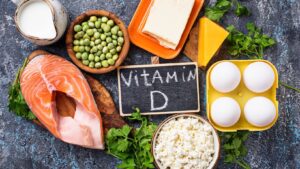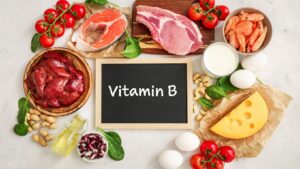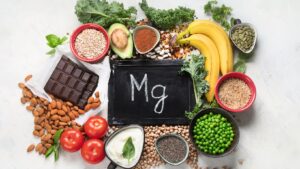|
Getting your Trinity Audio player ready...
|
Feel More Balanced: Vitamins For Stress And Anxiety Management
Stress is an inevitable part of life, but when it becomes overwhelming, it can significantly impact our health and well-being. While strategies like exercise, meditation, and therapy are well-known for managing stress, nutrition also plays a crucial role. Certain vitamins and minerals are essential in supporting a healthy stress response. This article delves into the science behind these nutrients, exploring how they influence mood, energy levels, and overall resilience. Whether you’re looking to incorporate stress-reducing foods into your diet or considering targeted supplementation, this guide offers valuable insights to help you find the best approach for your individual needs.
Table of Contents
ToggleThe Connection Between Nutrition and Stress
Our bodies require a variety of nutrients to function optimally, especially during times of stress. Chronic stress can deplete essential vitamins and minerals, leading to imbalances that may exacerbate feelings of anxiety and tension. By ensuring adequate intake of specific nutrients, we can support our body’s natural stress response and promote mental well-being.
Key Vitamins and Minerals for Stress Management
1. Vitamin D

Role in Stress and Anxiety:
Vitamin D is vital for brain health and mood regulation. Research suggests a link between vitamin D deficiency and increased risk of anxiety disorders. Supplementing with vitamin D has been shown to improve mood and alleviate symptoms of anxiety.
Sources:
- Sunlight: Exposure to sunlight enables the body to produce vitamin D naturally.
- Foods: Fatty fish (e.g., salmon, mackerel), fortified dairy products, and egg yolks.
- Supplements: Vitamin D3 supplements are commonly recommended, especially in regions with limited sunlight.
2. B Vitamins Complex

Role in Stress and Anxiety:
B vitamins, including B1 (thiamine), B2 (riboflavin), B3 (niacin), B5 (pantothenic acid), B6 (pyridoxine), B7 (biotin), B9 (folate), and B12 (cobalamin), play a crucial role in energy production and neurotransmitter synthesis. Adequate levels of B vitamins are associated with better stress management and reduced anxiety.
Sources:
- Foods: Whole grains, legumes, seeds, nuts, leafy greens, and animal products like meat, dairy, and eggs.
- Supplements: B-complex supplements can help ensure adequate intake, especially for individuals with dietary restrictions.
3. Magnesium

Role in Stress and Anxiety:
Magnesium is involved in numerous physiological processes, including muscle relaxation and neurotransmitter regulation. Low magnesium levels have been linked to increased anxiety and stress. Supplementation may help reduce these symptoms.
Sources:
- Foods: Leafy green vegetables, nuts, seeds, whole grains, and legumes.
- Supplements: Magnesium glycinate and citrate are forms known for better absorption.
4. Omega-3 Fatty Acids

Role in Stress and Anxiety:
Omega-3 fatty acids, particularly EPA and DHA, are essential for brain health. They possess anti-inflammatory properties and have been shown to reduce symptoms of anxiety.
Sources:
- Foods: Fatty fish (e.g., salmon, sardines), flaxseeds, chia seeds, and walnuts.
- Supplements: Fish oil or algal oil supplements can provide concentrated doses of EPA and DHA.
5. L-Theanine

Role in Stress and Anxiety:
L-Theanine is an amino acid found in tea leaves, known for promoting relaxation without drowsiness. It increases the production of calming neurotransmitters, aiding in stress reduction.
Sources:
- Foods: Green and black tea.
- Supplements: L-Theanine supplements are available for those who do not consume tea regularly.
6. Vitamin C

Role in Stress and Anxiety:
Vitamin C is a powerful antioxidant that helps reduce oxidative stress in the body. It also plays a role in neurotransmitter function, which can influence mood.
Sources:
- Foods: Citrus fruits, berries, bell peppers, and leafy greens.
- Supplements: Vitamin C supplements are widely available and can help meet daily requirements.
Incorporating These Nutrients into Your Routine
To effectively manage stress through nutrition, consider the following steps:
- Balanced Diet: Prioritize a diet rich in whole foods, including fruits, vegetables, lean proteins, and healthy fats.
- Supplement Wisely: If dietary intake is insufficient, consider supplements after consulting with a healthcare professional.
- Lifestyle Integration: Combine nutritional strategies with other stress-management techniques such as regular exercise, adequate sleep, and mindfulness practices.
Conclusion
Managing stress is a multifaceted approach that includes proper nutrition. Ensuring adequate intake of essential vitamins for stress and anxiety response and promote mental well-being. Always consult with a healthcare provider before starting any new supplementation to determine the best approach for your individual needs.
Note: This article is for informational purposes only and should not replace professional medical advice. Consult your doctor for personalized guidance.


